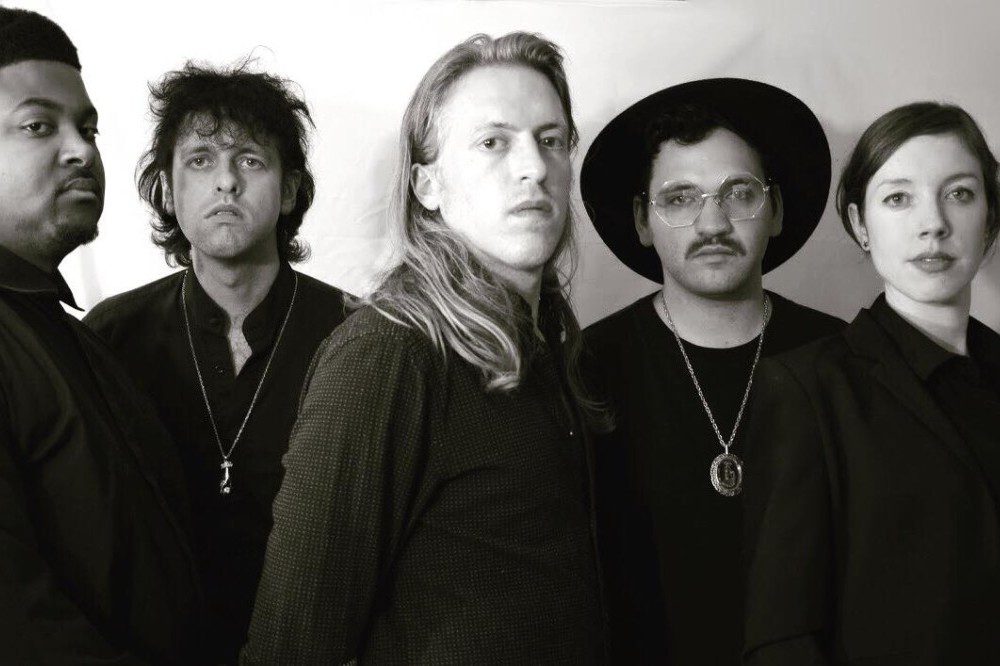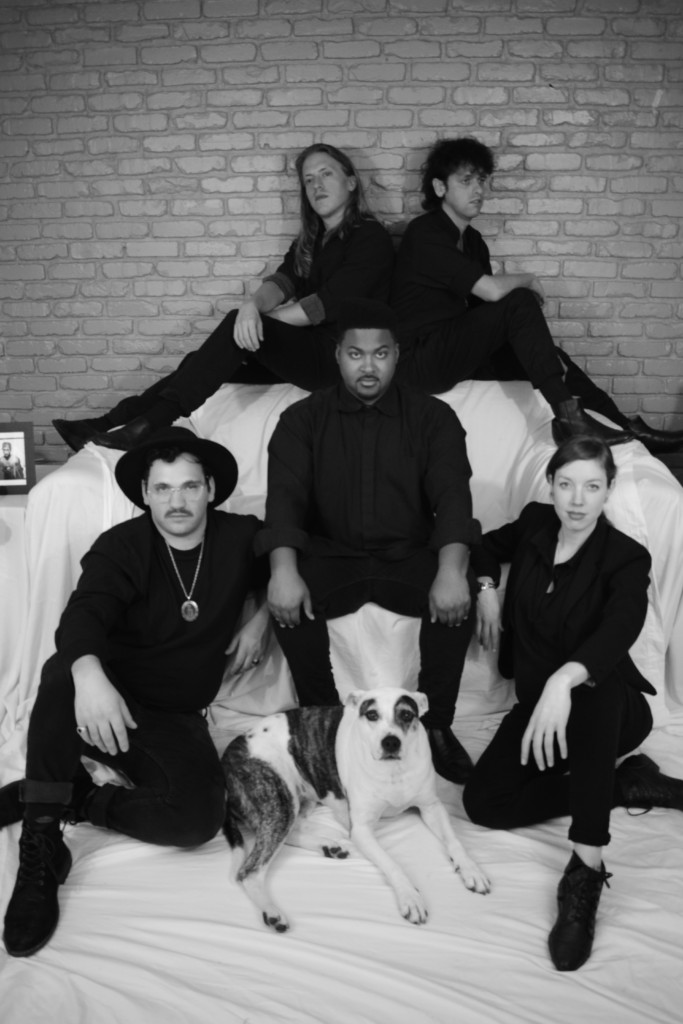PLAYING ATLANTA: Shepherds Explore Toxic Nostalgia with “Your Imagined Past” Video

For Atlanta sextet Shepherds, “genre” is a worn name tag hanging on by its last thread as theme and experimentation take prominence, rapidly setting the art-rock group apart in an ever-changing Atlanta market.
Since the release of their 2011 debut EP, Holy Stain, the band has been in a state of constant flux as they navigated rapid changes, from their lineup to the state of the world around them. Featuring the creative minds of Vinny Restivo,
Ryan York, May Tabol, Adrian Benedykt Świtoń, Peter Cauthorn, and Jonathan Merenivitch, the group released their expansive new LP, Insignificant Whip, on October 18th, following a music video for their lead single, “Your Imagined Past.”
Interest spurred by the band’s pointed lyricism and social commentary, I got the opportunity to sit down with lyricist and vocalist Jonathan Merenivitch to find out what drives the experimentalist evolution that keeps the group moving forward.
AF: You guys have been together for almost nine years now, released two full-length albums, and evolved sonically from a minimalist soundscape to lush, textured art-rock. What has it been like to see such organic evolution and growth as a band? How have you evolved individually as songwriters, musicians, and performers as the years have passed?
JM: It’s been very natural. When we started we had an idea that we would sound like Smokey Robinson meets Jesus and Mary Chain. A simple idea, kinda gimmicky, but a clear goal in terms of sound. As we’ve had a variety of musical experiences both as sidemen and collaborators/leaders in other projects, we’ve learned the necessity of that kind of genre elevator pitch but also the importance of not boxing ourselves in as musicians. We used to be very concerned with the wildness and diversity of our sound but now we’ve accepted that wildness. It’s a bit of a challenge to describe what exactly we sound like now and honestly that’s how we like it. We’ve listened and played too much music to be hemmed in by anyone’s expectations. That speaks to how we’ve grown as individuals in all these roles as well. Through our experiences, we’ve learned to be better songwriters, performers, and collaborators. We wrote most of these songs in a few weeks because we know the pitfalls and figured out how to move past them. Recording, on the other hand… that took a bit longer.
AF: What does the term “art-rock” mean to you?
JM: It feels kind of nebulous. It’s a sort of catch-all marketing term that gets used when a band seems kinda highfalutin and difficult to pin down. It works for us for now. It speaks volumes that the term has been used to describe artists ranging from fusion-era Miles Davis to Roxy Music.
AF: You tackle some weighty topics lyrically, from Catholic guilt and toxic masculinity to YouTube comments (a thoroughly modern source of inspiration). What inspires you as lyricists? How has music allowed you to express your discontent with the world we’re living in while also inspiring others to take action — or just make it another day?
JM: I look at an album as a diary of whatever I was thinking about when I was writing it. This was written around winter 2016 so I remember I was going out a lot, dating, being depressed, taking consideration of what exactly it means to be a man, taking stock of weird political changes that were slowly coming around the bend and just being on YouTube late at night trying to find weird shit to listen to and watch. You put all those things together and you have the lyrical contents of the record.
My hope with this record and all the things we do is that folks find we share their concerns and anxieties about living in this modern world and are inspired to do whatever they feel is appropriate, whether it’s finding some respite from this world or burning it all down.
AF: Can you tell us a bit about your songwriting process? Is it collaborative, or do you come in with a finished product and flesh it out as a group?
JM: For this record, one of us would usually bring in a demo or a snippet of a chord change or idea and then we would either stick pretty close to the demo or tear it apart and put it back together again. Sometimes that would be a really extensive overhaul; for example “Perhaps This was a Thorned Blessing, Pete” started off as a heavy Black Sabbath-style tune and we ripped it up and sped it into a goth punk thing. “Savor Your Sons” was a 30-second loop of the chorus that we expanded upon greatly. Other times it was subtle changes. “Your Imagined Past” is very similar to the demo and “Blood Moon” and “Perfecting a Function” are the same arrangement-wise, but [we] just added new elements like saxophone or synth.

AF: What do you love most about songwriting?
JM: I love the puzzle aspect of songwriting. Taking a piece and trying to figure out how to make the arrangement as satisfying as possible. What the song needs or doesn’t need to make it feel perfect.
AF: Do you feel that you’re able to express yourself as deeply through instrumentation as the lyrics themselves, or do you feel that they enhance each other?
JM: They enhance each other or in some cases inspire each other. The melody of “Perpetual Yearning” inspired the confessional nature of the lyrics.
AF: Which bands inspired your sound, and how have you evolved after years of playing together and in front of fans? How have the personnel changes affected you as a group, and how has it helped keep your sound fresh and modern instead of acting as an homage to a former lineup or a bygone era?
JM: There were a few sonic hallmarks and tidbits we were influenced by. The massive jangly guitar at the end of “Harborcoat,” the unusual percussion of Einstürzende Neubauten, the tambourine on “We Can Work It Out,” the soundscaping on To Pimp a Butterfly. The personnel changes have stopped us from ever getting too bored and each new person has added a new perspective that’s kept things interesting. We’ve recently been writing with a friend who has a background in bossa nova which has been interesting to experiment with.
AF: You released a music video for “Your Imagined Past” a few months ago. Can you tell us a bit about the song and what inspired it? Why did you choose it for your music video?
JM: The song was inspired by me reading the comments on a YouTube video for “Blinded by the Light” by Manfred Mann’s Earth Band. In the comments was a Baby Boomer lamenting a lost love and how they used to listen to the tune in his pickup truck. I began to wonder what kind of person would use the comments of a YouTube video of a classic rock song to express deep emotion and nostalgic regret and came up with the character at the heart of the song: someone who had nostalgia for a bygone era but was unable to reconcile it with his present. We chose it for the video because we wanted it to be the first single and the themes of the song lent themselves well to the themes of the video. Toxic nostalgia, Baby Boomer aesthetics, etc.
“You were full of shit then.
You’re full of shit now.
Your imagined past is just that.”
AF: What’s been your experience in the Atlanta market? How has the growing and changing scene given you space to grow and change as a band?
JM: I think we probably fit in better now than when we first started for a variety of reasons. The growing progressiveness of the scene allowed us more chances to express ourselves and play bigger stages. There are so many great bands and so much opportunity to play with excellent musicians. Everybody seems to be in a few different projects because of the quality of players here.
AF: What’s next for Shepherds?
JM: We’ve already started recording a new record and we’ll probably put out a new single by early next year. We plan on moving into new sonic territory. Less noise, more space, more melody, more focus on grooves. Something like soul music.
Keep up with Shepherds on Facebook, and stream Insignificant Whip on Spotify now.










